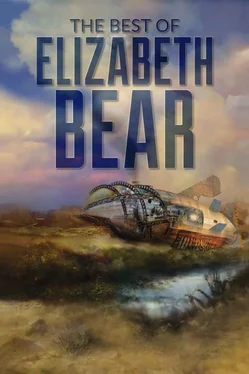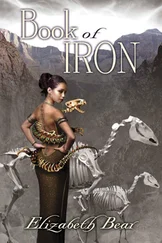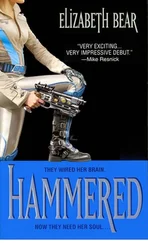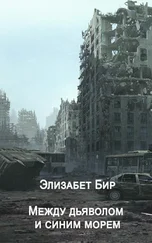She shouldn’t. It was a drain on her power cells, which she had no means to recharge, and she had a task to complete.
She shouldn’t—but she did.
Steam rose from her claws and the coquinas popped open, roasting in their own juices and the moisture of the seaweed with which he’d lined the net. Carefully, she swung the bag back to him, trying to preserve the fluids.
“Caution,” she urged. “It’s hot.”
He took the bag gingerly and flopped down to sit crosslegged at her feet. When he tugged back the seaweed, the coquinas lay like tiny jewels—pale orange, rose, yellow, green and blue—in their nest of glass-green Ulva , sea lettuce. He tasted one cautiously, and then began to slurp with great abandon, discarding shells in every direction.
“Eat the algae, too,” Chalcedony told him. “It is rich in important nutrients.”
When thetide came in, Chalcedony retreated up the beach like a great hunched crab with five legs amputated. She was beetle-backed under the moonlight, her treasures swinging and rustling on her netting, clicking one another like stones shivered in a palm.
The child followed.
“You should sleep,” Chalcedony said, as Belvedere settled beside her on the high, dry crescent of beach under towering mud cliffs, where the waves wouldn’t lap.
He didn’t answer, and her voice fuzzed and furred before clearing when she spoke again. “You should climb up off the beach. The cliffs are unstable. It is not safe beneath them.”
Belvedere hunkered closer, lower lip protruding. “You stay down here.”
“I have armor. And I cannot climb.” She thumped her fused leg on the sand, rocking her body forward and back on the two good legs to manage it.
“But your armor’s broke.”
“That doesn’t matter. You must climb.” She picked Belvedere up with both grabs and raised him over her head. He shrieked; at first she feared she’d damaged him, but the cries resolved into laughter before she set him down on a slanted ledge that would bring him to the top of the cliff.
She lit it with her floods. “Climb,” she said, and he climbed.
And returned in the morning.
Belvedere stayedragged, but with Chalcedony’s help he waxed plumper. She snared and roasted seabirds for him, taught him how to construct and maintain fires, and ransacked her extensive databases for hints on how to keep him healthy as he grew—sometimes almost visibly, fractions of a millimeter a day. She researched and analyzed sea vegetables and hectored him into eating them, and he helped her reclaim treasures her manipulators could not otherwise grasp. Some shipwreck beads were hot, and made Chalcedony’s radiation detectors tick over. They were no threat to her, but for the first time she discarded them. She had a human ally; her program demanded she sustain him in health.
She told him stories. Her library was vast—and full of war stories and stories about sailing ships and starships, which he liked best for some inexplicable reason. Catharsis, she thought, and told him again of Roland, and King Arthur, and Honor Harrington, and Napoleon Bonaparte, and Horatio Hornblower and Captain Jack Aubrey. She projected the words on a monitor as she recited them, and—faster than she would have imagined—he began to mouth them along with her.
So the summer ended.
By the equinox, she had collected enough memorabilia. Shipwreck jewels still washed up and Belvedere still brought her the best of them, but Chalcedony settled beside that twisted flat-topped sandstone rock and arranged her treasures atop it. She spun salvaged brass through a die to make wire, threaded beads on it, and forged links which she strung into garland.
It was a learning experience. Her aesthetic sense was at first undeveloped, requiring her to make and unmake many dozens of bead combinations to find a pleasing one. Not only must form and color be balanced, but there were structural difficulties. First the weights were unequal, so the chains hung crooked. Then links kinked and snagged and had to be redone.
She worked for weeks. Memorials had been important to the human allies, though she had never understood the logic of it. She could not build a tomb for her colleagues, but the same archives that gave her the stories Belvedere lapped up as a cat laps milk gave her the concept of mourning jewelry. She had no physical remains of her allies, no scraps of hair or cloth, but surely the shipwreck jewels would suffice for a treasure?
The only quandary was who would wear the jewelry. It should go to an heir, someone who held fond memories of the deceased. And Chalcedony had records of the next of kin, of course. But she had no way to know if any survived, and if they did no way to reach them.
At first, Belvedere stayed close, trying to tempt her into excursions and explorations. Chalcedony remained resolute, however. Not only were her power cells dangerously low, but with the coming of winter her ability to utilize solar power would be even more limited. And with winter the storms would come, and she would no longer be able to evade the ocean.
She was determined to complete this last task before she failed.
Belvedere began to range without her, to snare his own birds and bring them back to the driftwood fire for roasting. This was positive; he needed to be able to maintain himself. At night, however, he returned to sit beside her, to clamber onto the flat-topped rock to sort beads and hear her stories.
The same thread she worked over and over with her grabs and fine manipulators—the duty of the living to remember the fallen with honor—was played out in the war stories she still told him, though now she’d finished with fiction and history and related him her own experiences. She told him about Emma Percy rescuing that kid up near Savannah, and how Private Michaels was shot drawing fire for Sergeant Kay Patterson when the battle robots were decoyed out of position in a skirmish near Seattle.
Belvedere listened, and surprised her by proving he could repeat the gist, if not the exact words. His memory was good, if not as good as a machine’s.
One daywhen he had gone far out of sight down the beach, Chalcedony heard Belvedere screaming.
She had not moved in days. She hunkered on the sand at an awkward angle, her frozen limb angled down the beach, her necklaces in progress on the rock that served as her impromptu work bench.
Bits of stone and glass and wire scattered from the rock top as she heaved herself onto her unfused limbs. She thrashed upright on her first attempt, surprising herself, and tottered for a moment unsteadily, lacking the stabilization of long-failed gyroscopes.
When Belvedere shouted again, she almost overset.
Climbing was out of the question, but Chalcedony could still run. Her fused limb plowed a furrow in the sand behind her and the tide was coming in, forcing her to splash through corroding sea water.
She barreled around the rocky prominence that Belvedere had disappeared behind in time to see him knocked to the ground by two larger humans, one of whom had a club raised over its head and the other of which was holding Belvedere’s shabby net bag. Belvedere yelped as the club connected with his thigh.
Chalcedony did not dare use her microwave projectors.
But she had other weapons, including a pinpoint laser and a chemical-propellant firearm suitable for sniping operations. Enemy humans were soft targets. These did not even have body armor.
Читать дальше













